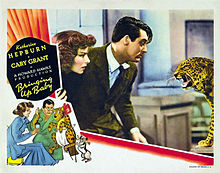
Back Ekssentrik komediya Azerbaijani Ексцентрична комедия Bulgarian Comèdia screwball Catalan کۆمیدیای سکروبۆڵ CKB Screwballová komedie Czech Screwball comedy Danish Screwball-Komödie German Frenezkomedio Esperanto Comedia screwball Spanish اسکروبال Persian

Screwball comedy is a film subgenre of the romantic comedy genre that became popular during the Great Depression, beginning in the early 1930s and thriving until the early 1950s, that satirizes the traditional love story. It has secondary characteristics similar to film noir, distinguished by a female character who dominates the relationship with the male central character, whose masculinity is challenged,[1] and the two engage in a humorous battle of the sexes.[2]
The genre also featured romantic attachments between members of different social classes,[3] as in It Happened One Night (1934) and My Man Godfrey (1936).[2]
What sets the screwball comedy apart from the generic romantic comedy is that "screwball comedy puts the emphasis on a funny spoofing of love, while the more traditional romantic comedy ultimately accents love."[4] Other elements of the screwball comedy include fast-paced, overlapping repartee, farcical situations, escapist themes, physical battle of the sexes, disguise and masquerade, and plot lines involving courtship and marriage.[2] Some comic plays are also described as screwball comedies.
- ^
Dancyger, Ken; Rush, Jeff (2006). Alternative Scriptwriting (Fourth ed.). Focal Press. p. 85. ISBN 978-0240808499.
The screwball comedy is funny film noir that has a happy ending... The premise of the film is about the struggle in their relationship. During the course of the struggle, which is highly sexually charged, the maleness of the central character is challenged. The female is the dominant character in the relationship. This role reversion is central to the screwball comedy.
- ^ a b c Cele Otnes; Elizabeth Hafkin PleckCele Otnes, Elizabeth Hafkin Pleck (2003) Cinderella dreams: the allure of the lavish wedding University of California Press, p. 168. ISBN 0-520-24008-1.
- ^ Beach, Christopher. Class, Language, and American Film Comedy. Cambridge University Press (February 11, 2002). p. 125.
- ^ Cite error: The named reference
:0was invoked but never defined (see the help page).